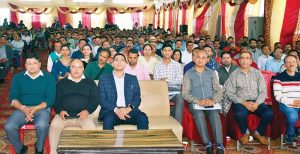Bright Career Options in Nuclear Engineering

Eligibility
To enter in the field of nuclear engineering, one needs a minimum qualification of bachelors degree in nuclear engineering. Those with 10 + 2 level educational qualification or equivalent with Physics, Chemistry, Mathematics and English are eligible to pursue undergraduate degree program in engineering. After 10+2 they have to qualify the engineering entrance test. For high designation jobs Masters Degree is required. One has to clear Graduate Aptitude Test in Engineering (GATE) to seek admission for 2-year M.Tech program in nuclear engineering.
Job Prospects
The field of nuclear engineering in India has good career potential for bright and highly qualified engineers in the Atomic Energy and Defence Sectors, Nuclear Medicine and Research and more particularly in the field of civil nuclear energy. Nuclear engineers work in laboratories, nuclear plants, universities and government agencies. The government employs nuclear engineers for military research, development of proper waste disposal methods and studying effects of radiation to the environment and living things. In the medical sector, nuclear engineers are engaged in scientific research for medical diagnostic and treatment techniques using radiation. In academics, nuclear engineers find employment as lectures and professors and actively contribute to nuclear researches. Others prefer to work in on-site engineering or construction projects. They may also work alongside other scientists in developing equipments that generate nuclear power. Sometimes, nuclear engineers serve as consultants in projects that involve nuclear energy. Besides, nuclear engineers can also pick up management or administration as a career option.
Remuneration
Nuclear engineering is considered as one of the highly paid job in the engineering field. The earnings of nuclear engineers gradually increase with higher qualification and experience as in the case of other jobs. A graduate in nuclear engineering normally earns Rs 25,000 – Rs 30,000 in the beginning of his career in private sector. This can even go high as Rs 1,00,000 with experience and masters degree.
Institutes
* S.R.M. University, Chennai (Tamil Nadu), 044-24742836
* Bhabha Atomic Research Centre, Mumbai (Maharashtra), 022-25592000
* Bhabha Engineering Research Institute, Bhopal (Madhya Pradesh), 0755-4000391
* Indian Institute of Technology (IIT Bombay), Mumbai, 022-25722545
Creative Career in Textile Engineering

Course Areas
There are several engineering colleges/polytechnics/ universities in India that offer programs in textile engineering and technology. The basic eligibility criteria for B.E / B.Tech in Textile Engineering is 10+2 or equivalent examination with Physics, Chemistry, Mathematics and Biology with a fairly high percentage of marks in the aggregate. After pursuing bachelor’s degree (B.E/B Tech), one can go for a post graduate degree; i.e. M.E/ M.Tech. and after that one can take up the Ph.D degree. Indian Institute of Technology, Delhi is a prominent institute in the field offering B.Tech/M.Tech/Ph.D programs.
Career Options
Textile engineering, being a creative and inventive field, offers several career opportunities in diverse industrial sectors. Textile engineers can find attractive opportunities in textile mills, export houses, knitwear manufacturing units, textile dyeing and printing units, and a large number of government-sponsored and private silk, handloom, jute, khadi, and craft development organizations. Typical employers include companies that produce clothing, soft furnishings and other textile-based products, big fashion retailers, design studios and consultancies. One with a degree in textile engineering can work as operations trainee, technical services assistant in a textile plant, process engineer, assistant designer in a design studio; quality control supervisor, sales in charge, fabric development executive, process improvement engineer etc. Graduates are recruited in large numbers by textile giants like Arvind Mills Ltd., Bombay Dying, Raymond’s, Fabindia, Grasim Industries, JCT Limited, Lakshmi Mills, Mysore Silk Factory etc.
Remuneration
Fresh engineering graduates from reputed colleges can receive starting pay-packages ranging from Rs.12,000 to Rs.30,000 per month. The salary increases with experience and skills. Experienced candidates can earn even more than Rs.50,000 per month apart from other incentives and perks. Lecturers in colleges get a starting salary of Rs12,000-Rs 18,000 a month. With more experience or as an established independent consultant one could earn more. Pay package is much better if we get chance to work abroad.
Keep watching our YouTube Channel ‘Divya Himachal TV’. Also, Download our Android App













